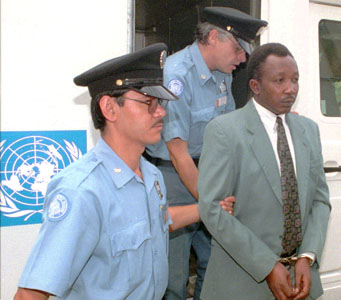
Twelve years ago this week (October 2, 1998), the International Criminal Tribunal for Rwanda, or ICTR, issued a historic sentencing that delivered punishment for the first conviction of genocide under international law. The ICTR convicted Jean-Paul Akayesu, mayor of Taba township in central Rwanda in 1994, of nine counts of genocide, crimes against humanity, and rape. For his crimes, Akayesu is serving three concurrent life sentences at a prison in Mali.
Not only was this the first instance that genocide was prosecuted as an international crime, but the ICTR’s ruling also set a precedent for rape to be considered a tool of genocide and to be prosecuted as such. The tribunal’s judgment determined that sexual violence amounted to “outrages upon personal dignity” and “serious bodily and mental harm.” Thus, it established that rape and other forms of sexual violence fall under the purview of Article II of the U.N.’s Convention on the Prevention and Punishment of the Crime of Genocide. This set the precedent for the codification of systemic sexual violence as a “crime against humanity” under the Rome Statute of the International Criminal Court, which specifies that “rape, sexual slavery, enforced prostitution, forced pregnancy, and enforced sterilization” constitute sexual violence and can be tried and punished as such.
In the years since the sentencing, sexual violence has been prosecuted as a war crime and crime against humanity on several occasions. The precedent set during the Akayesu case has been used to imprison those responsible for the rape camps in Bosnia where women were gang raped, for the forced infection of Rwandan women with HIV, and for the conscription of women into sexual slavery. Through these convictions, the ICTY, the ICTR, and the ICC have advanced the struggle for women’s human rights and shown that when a woman is sexually assaulted, the humanity of a human being is violated.
Despite these gains, the plight of women in war torn regions continues. According to the United Nations, since July of this year more than 500 women were raped in eastern Congo. During just a four-day span in late July and early August, 303 women, men, and children were raped in the Walikale region despite the presence of U.N. peacekeepers in the area. U.N. High Commissioner for Human Rights Navi Pillay described the atrocities as “cold-blooded and systematic” to a point that “the scale and viciousness of these mass rapes defy belief.”
The landmark ruling in the Akayesu case was surely a step forward in ending impunity for crimes of sexual violence. Of course, the responsibility for prosecuting crimes lies first and foremost with the Congolese judicial system, but while impunity reigns in eastern Congo, it is imperative that the international community push hard for accountability, whether through Congolese courts or international tribunals. As U.N. Special Representative for Sexual Violence in Conflict Margot Wallström said, “We cannot have zero tolerance without zero consequences.”

